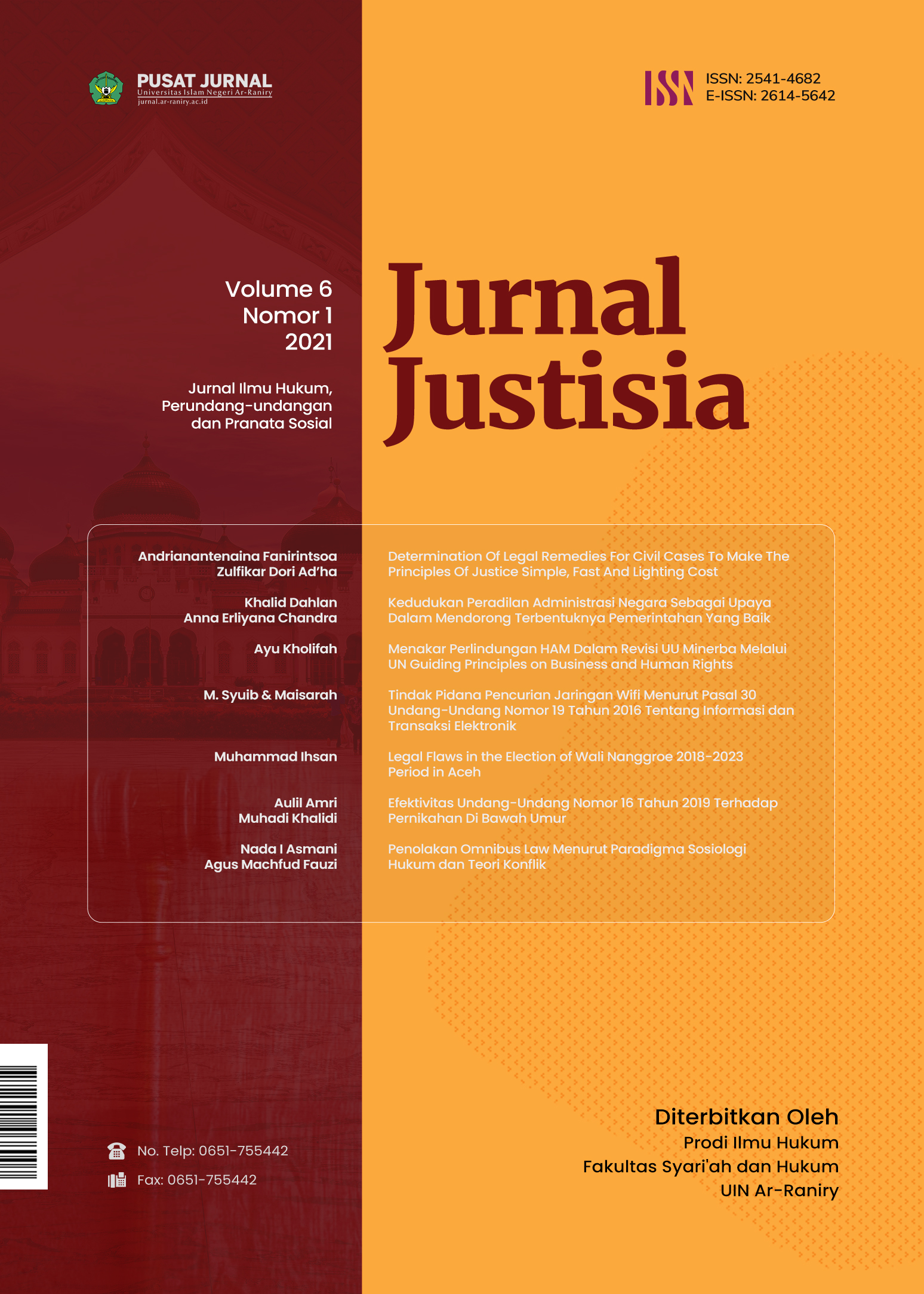Efektivitas Undang-Undang Nomor 16 Tahun 2019 Terhadap Pernikahan Di Bawah Umur
DOI:
https://doi.org/10.22373/justisia.v6i1.10613Abstract
Legal certainty and firmness must exist in a law or regulation. Because without legal certainty, the rights of legal subjects will be taken away and neglected. Likewise, without strictness in the law, it will make legal subjects feel worried and insecure because they feel that the law does not provide protection for them. Law Number 16 Year 2019 concerning Amendments to Law Number 1 Year 1974 is deemed not to have legal certainty and firmness, because the stipulation of the age limit for marriage in this law only considers and is based on Law Number 35 Year 2014 concerning Amendments to Law Number 23 Year 2002 Concerning Child Protection. Furthermore, Law Number 16 Year 2019 still provides an opportunity for the Indonesian people to carry out child marriage. Law Number 16 Year 2019 must look at various other legal aspects and have clear legal consequences, so a comprehensive revision of this law is required. Even if possible, Law Number 1 Year 1974 must be reviewed and adjusted to the current and future legal problems. By applying the concept of benefit and rejecting harm in a law or regulation, the objectives of the law or regulation will be achieved and become effective.References
Abd al-Rahman al-Jaziri, Kitab al-Fiqh Ala Madzahib alArba’ah, Beirut: Dar al-Kutub al-Ilmiyyah, 2003.
Abdur Rohman, Himpunan Peraturan Perundang-Undangan Tentang Perkawinan, Jakarta: Akademika Presindo, 1985.
Abdurrahim Umran, Islam dan KB, Jakarta: Lentera Batritama, 1997.
Bimo Walgito, Bimbingan dan Konseling Perkawinan, Yogyakarta: Yayasan Penerbitan Fakultas Psikologi UGM, 2000.
Chuzaimah T. Yanggo, Problematika Hukum Islam Kontemporer, Jakarta: Pustaka Firdaus, 2002.
H. Zahri Hamid, Pokok-Pokok Hukum Perkawinan Islam dan Undang-Undang Perkawinan di Indonesia, Yogyakarta: Bina Cipta, 1987.
Hasan Basri, Merawat Cinta Kasih, Yogyakarta: Pustaka Pelajar, 1996.
Kitab Undang-Undang Hukum Perdata (Burgerlijk Wetboek voor Indonesie)
Koentjaraningrat, Pengantar Psikologi Umum, Yogyakarta: Andi Ofset, 1994.
Mardi Candra, Aspek Perlindungan Anak Indonesia Analisis Tentang Perkawinan di Bawah Umur, Jakarta: Prenadamedia Group, 2018.
Muhammad Syah Ismail, Filsafat Hukum Islam, Jakarta: Bumi Aksara, 1982.
Muslim, Shahih Muslim, Jakarta: Dar Ihya’ al-Kutub al-Arabiyyah, t.t.
R. Soesilo, Kitab Undang-Undang Hukum Pidana (KUHP) Serta Komentar-Komentarnya Lengkap Pasal Demi Pasal, Bogor: Politeia, 1996.
Rahmat Hakim, Hukum Perkawinan Islam, Bandung: Pustaka Setia, 2000.
T. Yanggo, Fiqh Anak: Methode Islam Dalam Mengasuh Anak Serta Hukum-Hukum Yang Berkaitan Dengan Aktivitas Anak, Jakarta: AMP Press, 2016.
Undang-Undang No 35 Tahun 2014 Tentang Perlindungan Anak
Undang-Undang Nomor 1 Tahun 1974 Tentang Perkawinan
Undang-Undang Nomor 12 Tahun 2011 Tentang Pebentukan Peraturan Perundang-Undangan
Undang-Undang Nomor 16 Tahun 2019 Tentang Perubahan Undang-Undang Nomor 1 Tahun 1974
Undang-Undang Nomor 22 Tahun 1946 Tentang Pencatatan Nikah, Talak Dan Rujuk
Undang-Undang Nomor 4 Tahun 1979 Tentang Kesejahteraan Anak
UNICEF, Guide of The Convention on the Rights of Child (CRC), Jakarta: UNICEF.
Downloads
Published
Issue
Section
License
The Authors submitting a manuscript do so on the understanding that if accepted for publication, copyright of the article shall be assigned to Jurnal Justisia : Jurnal Ilmu Hukum, Perundang-undangan dan Pranata Sosial, Ar-Raniry State Islamic University, Indonesia as the publisher of the journal.
Jurnal Justisia : Jurnal Ilmu Hukum, Perundang-undangan dan Pranata Sosial right of first publication with the work simultaneously licensed under Creative Commons Attribution-ShareAlike 4.0 International License (CC BY-SA 4.0) that allows others to share (copy and redistribute the material in any medium or format) and adapt (remix, transform, and build upon the material) the work for any purpose, even commercially with an acknowledgment of the work's authorship and initial publication in Jurnal Justisia : Jurnal Ilmu Hukum, Perundang-undangan dan Pranata Sosial. Authors are able to enter into separate, additional contractual arrangements for the non-exclusive distribution of the journal's published version of the work (e.g., post it to an institutional repository or publish it in a book), with an acknowledgment of its initial publication in Jurnal Justisia : Jurnal Ilmu Hukum, Perundang-undangan dan Pranata Sosial. Authors are permitted and encouraged to post their work online (e.g., in institutional repositories or on their website) prior to and during the submission process, as it can lead to productive exchanges, as well as earlier and greater citation of published work (See The Effect of Open Access).

